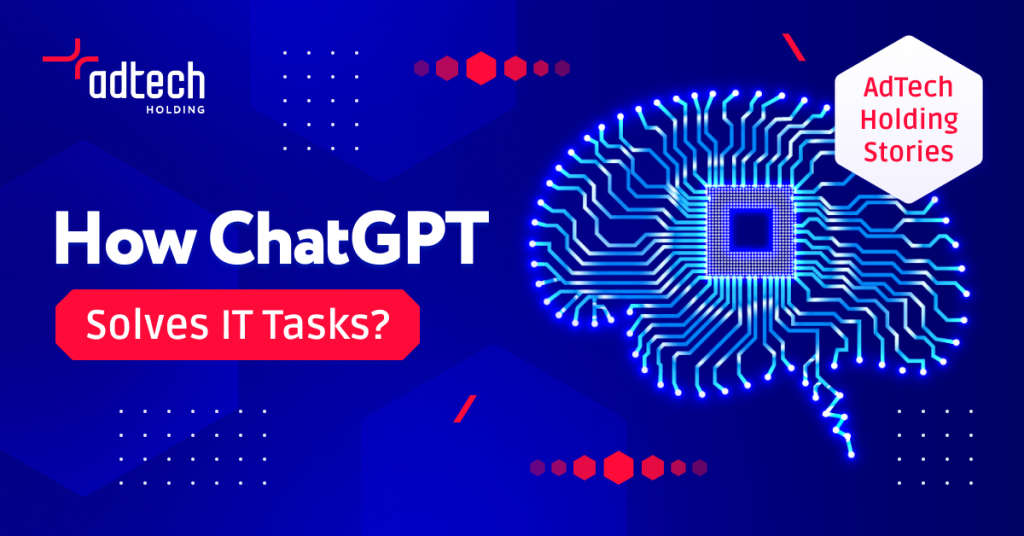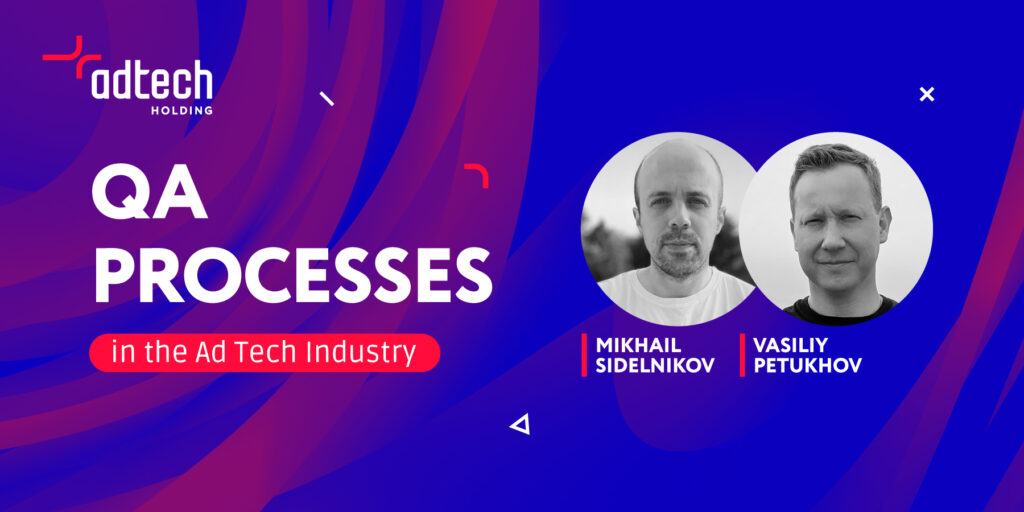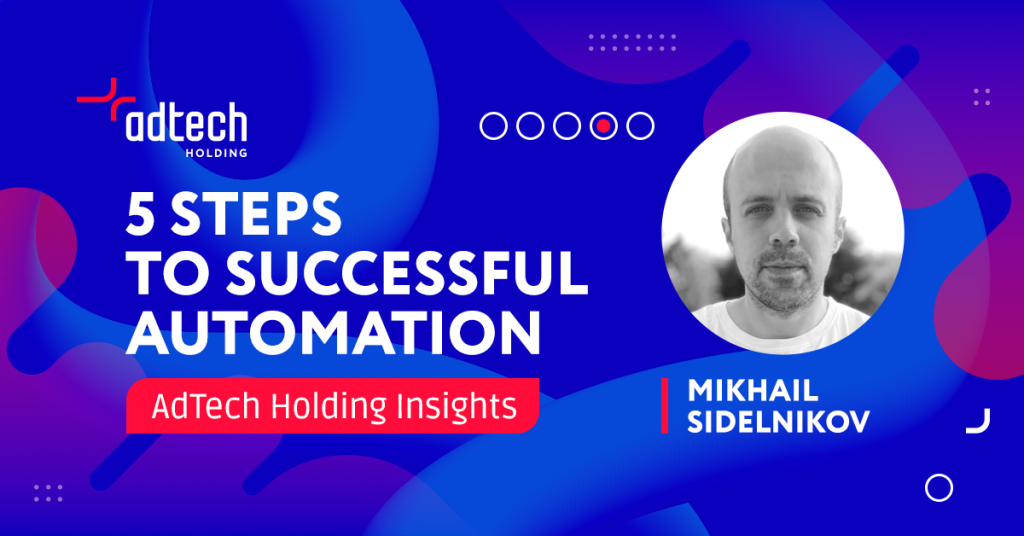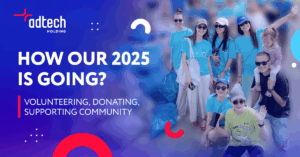Same Company, Different Job: How AdTech Holding QA Team Grows Professionals
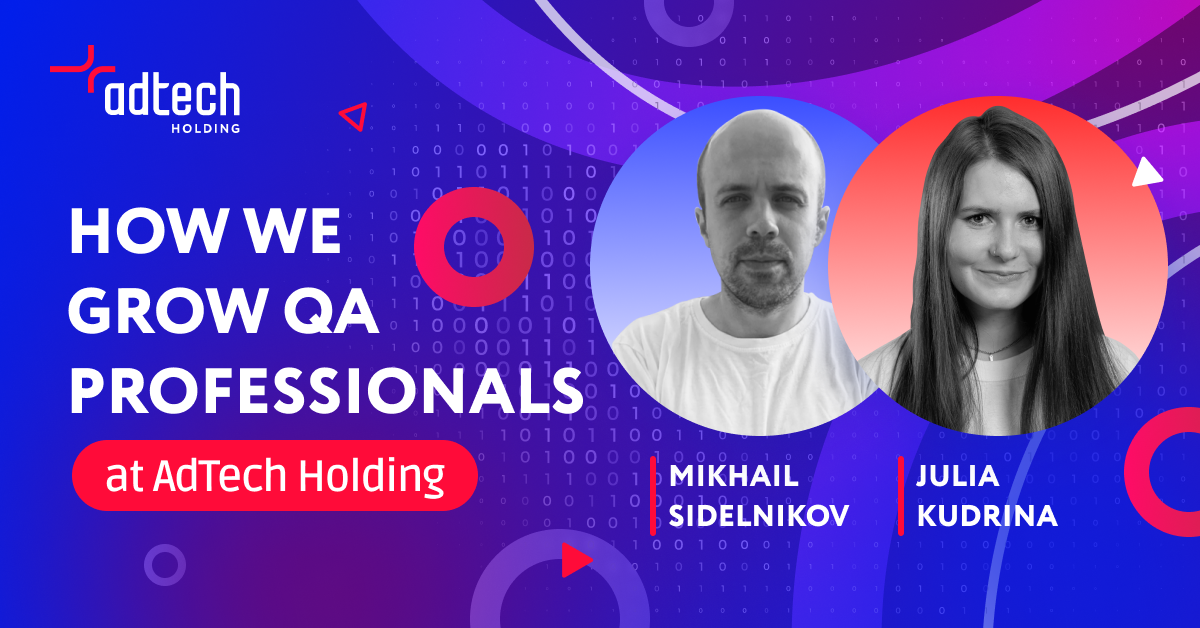
One of the biggest recruitment challenges is finding the candidate that fits both the job — and, which is not less important — the overall company’s vibe. The search for such a candidate might be time-consuming — and still fail if the new employee leaves after their probation period.
Is there a life hack that might simplify such a flow? One was suggested as a typical practice at AdTech Holding’s QA team: hiring new employees from the existing teams.
As Mike Sidelnikov, Head of QA, says,
At Adtech Holding, we strive to build the best product. And this requires the best people. Sometimes, it’s hard to find them somewhere outside. At the same time, we are very familiar with our colleagues from other departments — and they are well aware of the holding’s processes and product specifics. So, without extra onboarding, we can start growing new specialists right away.
Today, we will share the story of Julia, the QA Engineer, who used to work on the Optimization team but then revealed her potential in a different direction, remaining part of AdTech Holding.
But before we pass the word to her, we’ll listen to Mike, who will explain the practice in detail.
Mike’s Story: How to Grow a QA Specialist From Scratch
— Why did you decide to hire a non-experienced person? This can’t be just an old-boy network, right?
Mike: We have vast experience growing QA specialists from junior level to seasoned professionals. Of course, we hire people from outside, too. But there are several good reasons to invest in non-experienced employees from other AdTech Holding ‘non-technical’ departments:
- We already know that people share the same values and get along with their colleagues. So, we don’t risk hiring someone who doesn’t find our company comfortable for their career development.
- Such a move expresses genuine care about employees and perfectly meets our goal to help people develop in the direction they want. We love giving new opportunities to motivated employees!
- Finally, a newcomer requires a much more in-depth onboarding, from the office tour to product specifics. We simply skip this part when hiring people from other departments who have been with us for a while.
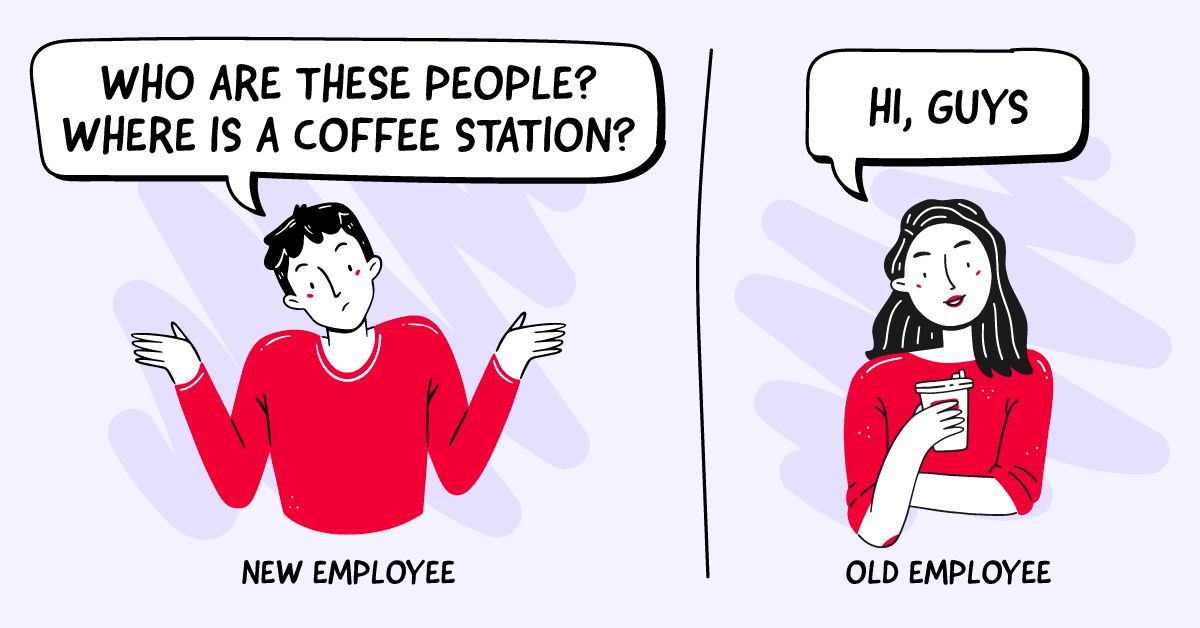
— But how do you know a person will fit the new position? Is there some kind of interview?
Mike: Yes, sure. Julia, the hero of our story today, used to work in our Optimization department. Meanwhile, we were looking for a QA specialist for one of our product teams, and the job specifics didn’t require much experience in QA.
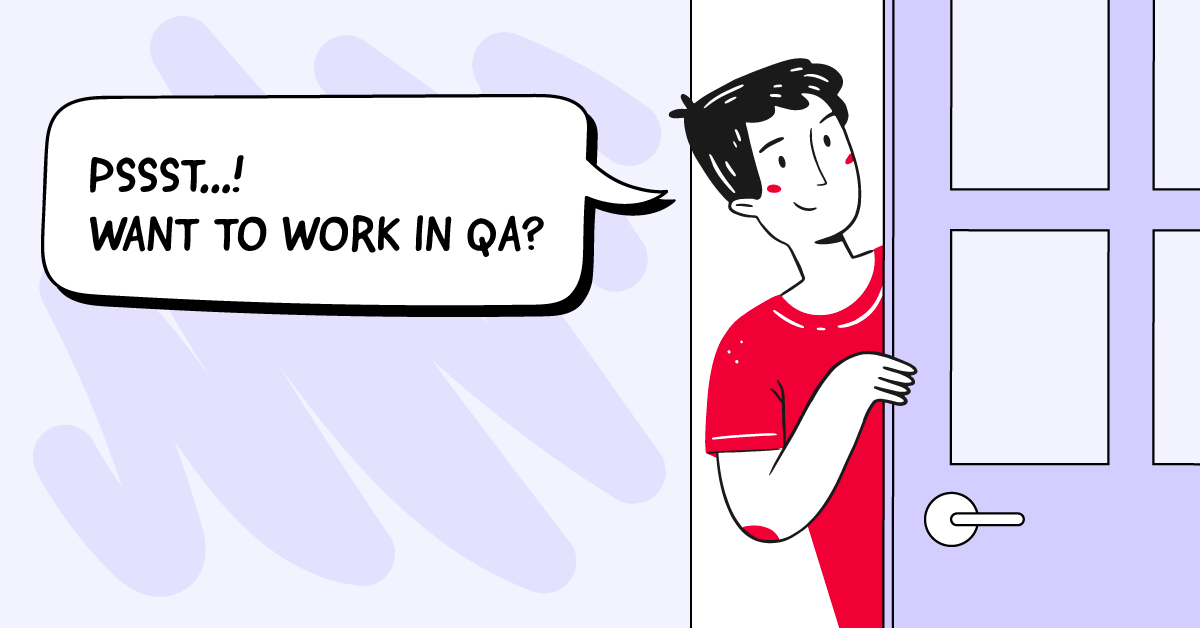
So, we suggested Julia an interview with a simple test task — it mainly checked the overall understanding of QA processes. We saw she had a big desire to learn and grow, and this was exactly what we were looking for.
— How does the ‘specialist growth’ process look?
Mike: The best part of it is that all our colleagues take part in helping a novice. Here is how it generally happens:
- Teammates explain the tasks and overall working processes and share skills
- People from fellow QA teams show around the infrastructure of the QA department and explain its culture.
Overall, a new employee will always find help — with any problem they need to solve.
Besides, we give some extra opportunities: for example, we are ready to invest in any education or conference our employees want to visit.
— And does such an employee have further growth opportunities?
Of course. After some time, our junior QAs are not juniors anymore. And we have two options for them to keep growing:
- Engineers from one team can help with other teams’ tasks.
- Engineers join other teams full-time, find new experiences, and learn new technologies.
Julia’s Story: From Optimization to QA Engineer
Now, it’s time to compare the vision of Mike and Julia — an unprecedented chance to check it! We asked Julia to share her path in Quality Assurance — so here is her experience.
— How did it all happen, after all? Did you wake up one day with the thought, ‘ Now I want to be a QA at AdTech Holding’?
Julia: I began my career path as an engineer in the development and construction of mobile communications. Later, I became a content manager in the same company as I’ve always had an interest in the web industry — and my new position also involved searching for bugs and manual checks of new releases.
When I came to AdTech Holding, I joined the PropellerAds Optimization team. I tracked statistics and picked the best formats, GEOs, and targeting to boost ad campaigns and other stuff related to this. However, I still kept my interest in searching for product bugs and mistakes.
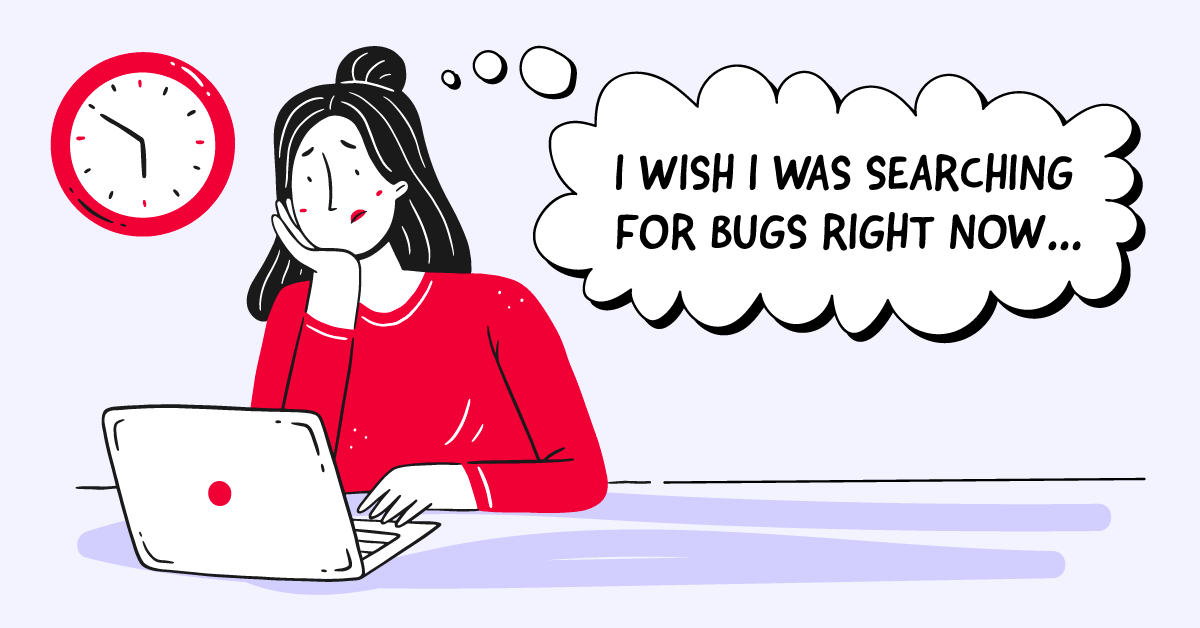
A year and a half ago, I completed a test task for our QA team. I needed to write testing scripts for the PropellerAds site registration page. I created about 30 test cases, found several bugs, and finally passed the interview with the Head of QA and the Product QA.
It is symbolic that a year later, during voyaging to another team, I covered that exact registration page with autotests.
Finally, I started working at the PropellerAds SWAT — a quick response service team and internal technical support. This team deals with tasks that require quick solutions, like bug fixing, writing parsers, dealing with stats discrepancy, etc.
That’s how my journey began: with the knowledge of SQL, HTML/CSS basics, testing theory, and a big desire to work and evolve.
— Was it a hard journey? What did you do, and what were the most difficult parts?
Julia: My responsibilities included manual testing of the internal system, running autotests, finding bugs, reporting in Jira, creating test cases, writing complex SQL queries, and working with HTTP requests in PostgreSQL and the command line.
Yes, this was challenging sometimes. For example, I couldn’t always fully understand how particular services worked. Later, when I began learning Java, I found it difficult, too! However, I always got support and encouragement from my new teammates.
Another inspiring thing: every day brought me new tasks, and I felt how my work affected the quality of the product. That was the drive in my professional development.
— Did anything change since you entered the QA field? Maybe some new duties?
After several months of work, I realized that automation was the next step in my career evolution. So, I began learning Java, reading articles, diving into the theory, and performing tasks at programming simulator sites.
My company and manager encouraged me to develop in a new field, so I went to the professional courses, which became my mainstay in the world of test automation. Here’s what I learned there:
- Java as a language for autotests
- Existing frameworks
- Differences between Selenium, Selenide, and Selenoid
- How to work with the API
- What are Gradle and Maven
- How to connect a test case and an autotest in Allure TestOps and more.
— Professional courses sound great. What else does the Holding do to help growing specialists?
Julia: Every quarter, I went through a review with the team leader and Head of QA, where we discussed the past three months of work and built a progress strategy. At these meetings, I could share my success, discuss difficulties, and hear feedback about my work.
Besides, AdTech Holding regularly hosts skill sharing from experienced colleagues and specialists from other companies. This can include information about the PropellerAds network in general or some special knowledge about its technologies. For example, at the last skill-sharing session, I learned how to interact with the Go Grid Router (GGR) as a QA engineer.
Besides, the Holding helped me to attend the HighLoad and SQA Days conferences, full of exciting reports about IT technologies that I can use in my everyday work. Also, I met professionals working in different CIS and European companies, figured out what technologies they implemented for automation testing, and found out how they see the further development of QA. It was a brilliant experience!
— Tell us about something you remembered the most on your way!
When I began working in my first QA team, I was very happy to receive the first positive feedback from my colleagues and management. It was valuable to understand they saw my efforts to help the team, quick performance, and a very small percentage of errors.
Also, when I began working with autotests, I was genuinely delighted with the pull request approvals at GitHub. I still am, to be honest.
That is the story so far. We wish Julia success in her career — and give a huge thanks to her and Mike for sharing this inspiring story.
